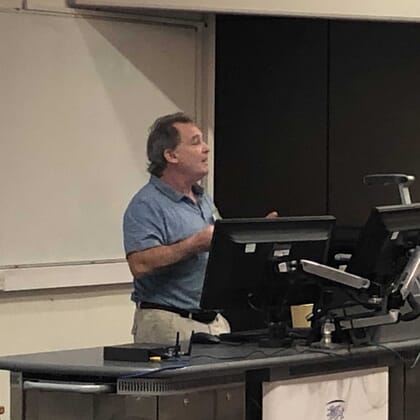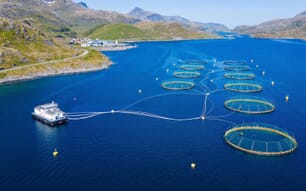Opening the symposium, Professor Carlos Garcia De Leaniz of Swansea University explained the reasons for holding the symposium, including the increasing consumer awareness and care about fish welfare, and the need for producers to be compliant with welfare standards and to understand the importance of implementing these standards.

Professor Garcia De Leaniz also highlighted how healthy and stress-free fish have better growth rates in aquaculture systems. However, he noted, there are significant gaps in appropriate welfare standards and their implementation in some of the 600 or so species cultured worldwide.
Talks at the symposium were wide-ranging. Filipa Castanheira of the University of Algarve explained the work of the CAREFISH project, establishing scientific welfare standards across 30 species. Dr Castanheira highlighted experimental evidence which shows that fish feel pain, and anatomical evidence showing that fish have rich sensory worlds, with many fish species recognising and protecting their kin as well as possibly experiencing some emotions.
The effects of stress on the welfare of farmed fish were discussed by Professor Michail Pavlidis, of the University of Crete. Results from experiments on sea bass and sea bream suggest that fish exposed to early stress show statistically significant slower growth rates.
Dr Sonia Rey Planellas of Stirling University explained the use of fish behaviour as an operational welfare indicator (OWI) in aquaculture and the importance of understanding natural behaviour for comparison with any abnormal fish behaviour within farming systems. The development of OWIs for lumpfish was the subject of a talk by Carolina Gutierrez-Rabadan of Swansea University’s Centre for Sustainable Aquatic Research. With up to 50 million lumpfish required by the salmon farming industry in 2020, the health and welfare of lumpfish is a key aspect: healthy and happy lumpfish are much more efficient at de-lousing salmon.
Continuing the lumpfish theme, Daniel Phillips of Ocean Matters, the UK’s largest lumpfish farmer, which is projected to produce 4 million fish annually, spoke of the importance of good technology, species knowledge and controlled environmental parameters, towards maintaining high welfare standards within their production systems.
The RSPCA Assured schemes for fish welfare were outlined by Malcolm Johnstone, who emphasised that good welfare is good business. Working closely with the industry, RSPCA Assured now have over 70 percent of Scottish salmon farms signed up to their welfare scheme, with RSPCA standards for wrasse and lumpfish welfare currently under development.
Inês Ajuda from Compassion in World Farming provided details of a survey of 9,000 adults in nine European countries. The survey’s results show that 65 percent of people think that fish are sentient and feel negative emotions, and 79 percent of those surveyed think that salmon welfare should be better protected ahead of their perception of the welfare available for dogs, chickens, pigs and lobsters. 78 percent of those surveyed would also like to see evidence of fish welfare standards on fish packaging product labels.
Swansea University are to be commended for hosting this very informative, timely and balanced look at fish welfare in aquaculture. Professor Garcia De Leaniz told The Fish Site that Swansea University will be looking to host regular future fish welfare symposia.
The symposium was followed by a workshop on lumpfish welfare this afternoon.


